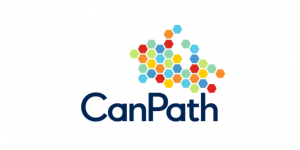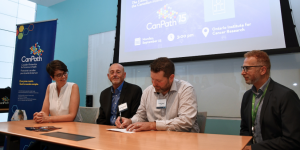
Jessie Shen
Administrative Coordinator, Computational Biology
j2shen@oicr.on.ca
Dr. Philip Awadalla, PhD, is the Executive Scientific Director of the Ontario Health Study and National Scientific Director for the Canadian Partnership for Tomorrow’s Health (CanPath), Canada’s two largest population studies.
Dr. Awadalla is also Senior Researcher of Molecular Genetics at the University of Oxford’s Nuffield Department of Population Health, the Big Data Institute and Oxford Cancer. As past Director of Computational Biology at the OICR, Philip Awadalla led efforts in early cancer detection and precision oncology, focusing on clonal hematopoiesis, breast and prostate cancer. Dr. Awadalla’s main research interests include identifying genomic determinants of blood disorders and cancers, understanding mutation and recombination biology and genomic epidemiology of age-related disorders in population cohorts. Dr. Awadalla was trained at the University of Edinburgh.
- Director, Computational Biology, OICR
- Senior Investigator, OICR
- Executive Scientific Director and Principal Investigator, CARTaGENE, CHU-Ste Justine
- Associate Professor, Ste Justine Hospital Research Centre, Department of Pediatrics Faculty of Medicine, University of Montreal
- Wellcome Trust International Travelling Research Fellow, University of Edinburgh and University of California Davis
- National Science and Engineering Research Council Postdoctoral Fellow and Killam Postdoctoral Fellow, University of British Columbia
- PhD, University of Edinburgh
- Executive Scientific Director, Ontario Health Study
- National Scientific Director, Canadian Partnership for Tomorrow’s Health (CanPath)
- Principal Investigator and Director, Genome Canada Canadian Data Integration Centre
- Professor, Department of Molecular Genetics, Faculty of Medicine, University of Toronto
- Professor, Division of Epidemiology, Dalla Lana School of Public Health, University of Toronto
- Adjunct Professor, CHUM, Department of Medicine, Faculty of Medicine, University of Montreal
- Ang Houle A, Gibling H, Lamaze FC, …, Awadalla P. Aberrant PRDM9 expression impacts the pan-cancer genome landscape. Genome Res. 2018; In press.
- Dummer T, Awadalla P, Boileau C, …, CPTP Regional Cohort Consortium. The Canadian Partnership for Tomorrow Project: a pan-Canadian platform for research on chronic disease prevention. CMAJ. 2018;190(23):E710-E717.
- Favé M, Lamaze F, Soave D, …, Awadalla P. Gene-by-environment interactions in urban populations modulate risk phenotypes. Nature Commun. 2018; 9(1):827.
- Hussin JG, Hodgkinson A, Idaghdour Y, …, Awadalla P. Recombination affects accumulation of damaging and disease-associated mutations in human populations. Nature Genet. 2015;47(4):400-4.
- Hodgkinson A, Idaghdour Y, Gbeha E, …, Awadalla P. High-resolution genomic analysis of human mitochondrial RNA sequence variation. Science. 2014; 344(6182):413-5.
- Hussin J, Sinnett D, Casals F, …, Awadalla P. Rare allelic forms of PRDM9 associated with childhood leukemogenesis. Genome Res. 2013; 23(3):419-30.
- Awadalla P, Boileau C, Payette Y, …;
CARTaGENE Project. Cohort profile of the CARTaGENE study: Quebec’s population-based biobank for public health and personalized genomics. Int J Epidemiol. 2013; 42(5):1285-99. - Conrad DF, Keebler JE, DePristo MA, …, Awadalla P; on behalf of the 1000 Genomes Project. Variation in genome-wide mutation rates within and between human families. Nature Genet. 2011;43(7):712-4.
See Dr. Awadalla’s recent publications on Google Scholar.
- Queens Department of Pathology and Molecular Medicine Distinguished Lecturer 2018
- Academy of Sciences of South Africa, Distinguished Scholar, 2016
- The Canadian Society for Clinical Investigation Young Investigator Award, 2012
- Genome Quebec, Recruitment Award, 2010-2015
- FRSQ, 2008-2011; 2012-2016
- Sigma Xi, 2005
The Ontario Health Study
The Ontario Health Study (OHS) is a long-term health study following the health of more than 230,000 Ontarians collecting data through questionnaires, blood samples and physical measurements. The goal is to build a platform that researchers can use now and decades into the future to better understand the causes of cancer and chronic disease.
The Canadian Partnership for Tomorrow Project
The Canadian Partnership for Tomorrow Project (CPTP) is Canada’s largest group of volunteer research participants (population cohort), built to address key questions about what causes cancer and chronic disease. Over 300,000 Canadians aged 30-74 years have joined CPTP. With a rich collection of data and biosamples, CPTP is an invaluable tool for scientists working to answer important questions for Canadians—questions that could not be addressed otherwise. Access to these data and biosamples is controlled by a set of policies, and managed by the CPTP Access Office.
The Canadian Data Integration Centre
Advances in genomics over the past several years have given rise to enormous amounts of data. Genomic data from population and clinical cohorts, coupled with vast health and lifestyle data can generate important biological insights in human health, but only if that data can be stored and analyzed in new and more sophisticated ways. Indeed, advances in genomics will be made – or hindered – by bioinformatics analytical capacity.
The Canadian Data Integration Centre (CDIC) will offer “soup to nuts” analytical and bioinformatics support to genomic researchers by providing the software and analytic systems to collect and harmonize data, analyze it and electronically publish the results.
Visit OICR’s Collaborative Research Resources directory for more opportunities to collaborate with OICR researchers.
- LDhat
- deNovo






